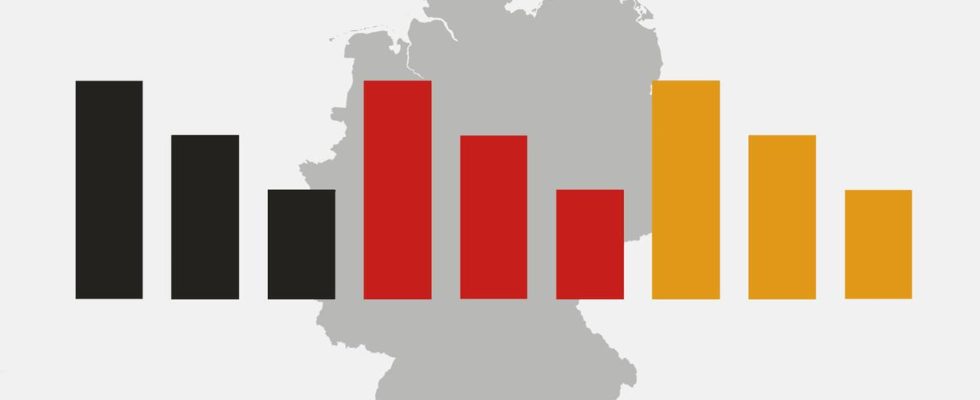Loud ARD GermanyTrend Many Germans are dissatisfied with migration policy. Almost two thirds want Germany to accept fewer refugees. Overall, skepticism about immigration is also growing.
It is a topic that has been hotly debated for years: migration policy. Due to the increasing number of asylum applications this year and the upcoming state elections in Bavaria and Hesse, the debate has been very intense again in recent weeks.
And the Germans’ view of the issue is becoming more critical across all parties: 73 percent of those surveyed currently believe that the accommodation and distribution of refugees in Germany is rather poor or very poor. Accordingly, only 19 percent think that this works very well or fairly well. This rating has deteriorated the most significantly – in September 2018, 43 percent said that the accommodation and distribution was successful.
78 percent currently think that the integration of refugees into society or the labor market is rather poor or very poor. And 80 percent say that the deportation of rejected asylum seekers is done rather poorly or very poorly.
In view of these visible deficits in refugee policy, skepticism towards immigration as a whole is growing: When asked whether Germany has advantages or disadvantages through immigration, 64 percent currently say that they see more disadvantages. That is 10 points more compared to May of this year. 27 percent (-6) see immigration as having advantages for Germany.
At the same time, 64 percent are currently in favor of Germany taking in fewer refugees. That is 12 points more than in May of this year. 27 percent want to take in the same number of refugees as before (-6). Only 5 percent (-3) advocate taking in more refugees.
Majority in favor of measures Immigration restrictions
The more critical view of immigration is also reflected in the support for measures to limit it: 82 percent of those surveyed are currently in favor of increased border controls, 77 percent are in favor of concluding refugee agreements with African states, and the classification of Algeria, Morocco and Tunisia as safe Countries of origin 69 percent.
Since CSU leader Markus Söder called for an “integration limit” when accepting asylum seekers, there has been renewed debate about an upper limit for accepting refugees. Critics emphasize that such an upper limit cannot be adhered to under international law. But 71 percent of Germans think such an upper limit is correct – 8 points more compared to March 2016. Approval extends to all party supporters with the exception of the Greens.
When it comes to the question of how the handling of refugees can best be regulated, 64 percent of Germans are currently in favor of a solution at the European level. That is 11 points less compared to June 2018. 31 percent (+9) think a national solution makes more sense. Although almost two thirds prefer a European solution, a majority also doubts that such a solution will exist. 70 percent (+11) believe that this cannot be implemented at European level in the near future, 23 percent (-13) believe it can be implemented in the near future.
discontent with the functioning of democracy
Next week marks the 33rd anniversary of German reunification. Despite numerous crises and currently great dissatisfaction with the work of the traffic light government, a large majority of people in West and East support democracy as a political model. 87 percent of West German and 77 percent of East German voters generally consider democracy to be a good form of government.
However, the current practice of German democracy is much less convincing. Across Germany, 55 percent are less or not at all satisfied with the way democracy works overall – 8 points more compared to October 2022. 44 percent (-7) are very satisfied or satisfied.
The values differ between West and East: while in West Germany a good half (52 percent, +8) are less or not at all satisfied, in East Germany the figure is two thirds (66 percent, +3). This means that satisfaction with the functioning of democracy is declining in both parts of the republic.
Investigation facility
Population: Eligible voters in Germany
Collection method: Random-based telephone and online survey
Survey period: September 25th to 27th, 2023
Number of cases: 1,302 respondents (776 telephone interviews and 526 online interviews)
Weighting: according to sociodemographic characteristics and recall of voting behavior
Range of fluctuation: 2 percentage points for a share value of 10 percent
3 percentage points for a share value of 50 percent
Implementing institute: infratest dimap
Results are rounded to whole percentages to avoid false expectations of precision. For all representative surveys, fluctuation ranges must be taken into account. In the case of a survey with 1,000 respondents, these amount to around three percentage points for large parties and around one point for smaller parties. In addition, the rounding error is significant for small parties. For these reasons, no party is shown below three percent in the Sunday question.

